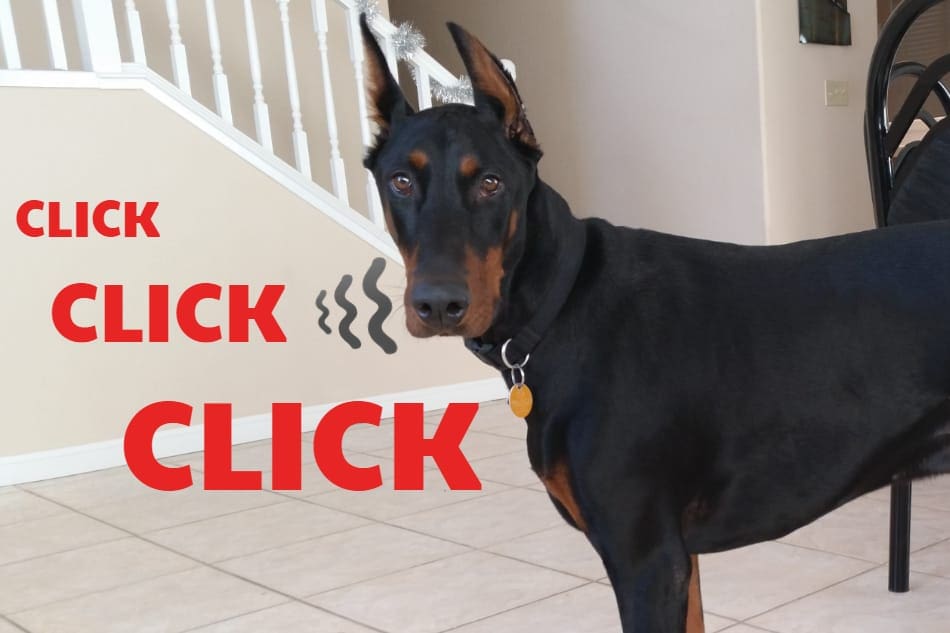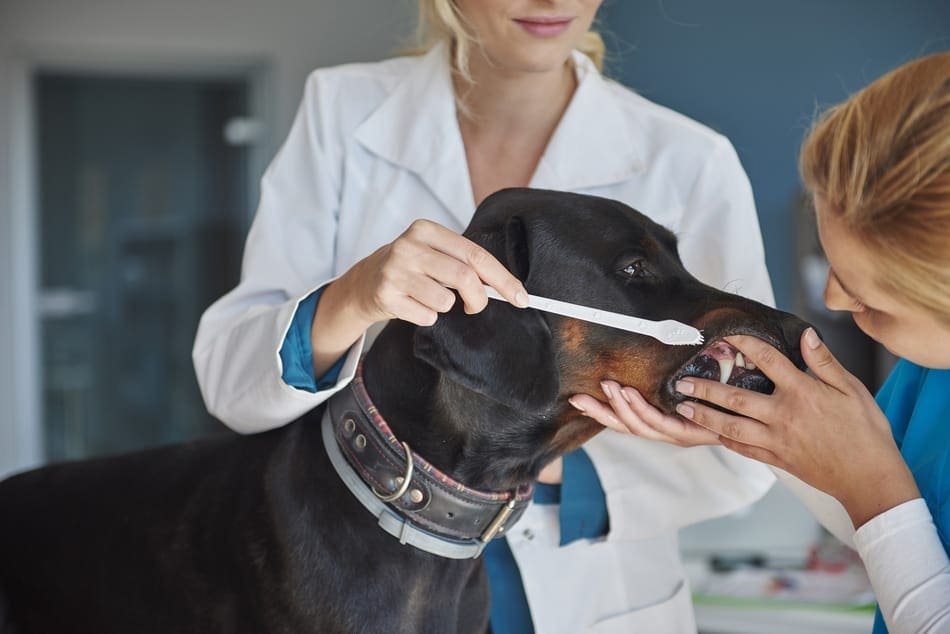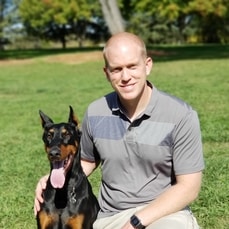
If you’ve ever noticed your Doberman’s teeth chattering like most of us Dobie owners do from time to time, you may have written it off as a simple reaction to colder weather. Now, however, you might have even started hearing that rapid “click click click” of their teeth even when your dog is plenty warm. That’s when we tend to get concerned as owners. Our Dobermans often chatter their teeth and it can be for any number of reasons ranging from mild to severe.
Why are my Doberman’s teeth chattering? Dobermans most commonly chatter their teeth when they are cold, excited, anxious, or scenting. However, more serious reasons include underlying tooth decay, issues with the trigeminal nerve, or even a warning sign of a possible seizure or stroke.
In most cases, there’s no need to be worried. Dobermans are the most commonly reported breed to experience teeth chattering (usually between the ages of 2 to 4, but it can occur at any time), according to Dr. Stacy, DVM (source). However, if you notice your dog’s teeth constantly chattering and you’ve ruled out some of the more obvious causes, take your Doberman to your local veterinarian to get a professional opinion. Below are some of the most common causes for a Doberman to be chattering their teeth.
1. Cold
Prevalence: High
The simplest explanation for chattering teeth, especially among Dobermans, is also the most obvious: they’re cold. Chattering teeth is like shivering, but doesn’t require the same amount of energy as shivering the whole body does. When an animal (or human) shivers, all of the muscles in the body contract and release over and over again in rapid succession, which raises their internal temperature.
Like humans, Dobermans get cold when the weather drops below a certain temperature. In general, a Doberman’s internal temperature is between 101 and 102.5 degrees Fahrenheit (or about 38 to 39 degrees Celsius). Anything lower than 100 degrees Fahrenheit is considered hypothermia in dogs (source).
Dobermans are known for their tendency to get cold easily. Many times I’ve found my Dobermans curled up in front of a fireplace or heater vent, even on a relatively warm summer day. Oftentimes their teeth are chattering or even their whole body might be shivering. Keep your Doberman warm and even consider getting a coat for your Dobie if necessary.
2. Excitement
Prevalence: High
If you notice your Doberman’s teeth chattering when you get home from work, or when you’re getting ready to head out on a walk, then the teeth chattering may actually be a sign of excitement. You can read one Doberman owner’s story about how her dog’s teeth always chatter from the excitement of her return from work each day here.
The rapid expansion and contraction of the muscles in your dog’s jaw may simply be a way of “burning off some steam” and releasing all the extra energy from their excitement. This is especially true in dogs who have been trained not to jump or express excitement in similar ways. In other words, teeth chattering may simply be a harmless expression of how excited your Doberman is.
3. Nervousness or Anxiousness
Prevalence: High
Besides chattering their teeth to let off steam when excited, they also do it to let off excess energy when they’re nervous or anxious. Dobermans are well known for suffering from separation anxiety. They often stick to the side of their owners like glue (one reason they’re called “velcro dogs”).
In one study published in the Journal of the American Veterinary Medical Association, hyper-attachment was shown to be significantly associated with separation anxiety in dogs (source). And Dobermans can certainly be described as “hyper attached” dogs.
This is slightly more prevalent in older Dobermans than it is in younger Dobermans, so if your dog is a bit on the older side, you may notice that they may be chattering their teeth more than they used to. Dobermans are relatively prone to anxiety as compared to other breeds, so yes, they use teeth chattering as a calming or anti-anxiety method. You can learn more about Doberman separation anxiety here.
4. Scenting
Prevalence: High
While it may seem counterintuitive, dogs actually use their mouths to smell. The nose is still the primary olfactory organ, but dogs actually have an additional sensory organ situated on the roofs of their mouths called Jacobson’s organ which helps them process the smells they take in (source).
When dogs chatter or gnash their teeth, it’s essentially the same as “chewing up” the air. The short, sharp bursts of air that they take in can help them process some of the smells they’re experiencing.
If you notice your male Doberman’s teeth chattering when they’re around other dogs, females especially, they may just be trying to process the pheromones they’re smelling. Some Doberman owners refer to this as “potty mouthing” when a male sniffs a female’s rear-end or urination outside. You may also notice an increase in saliva or even drooling when they do this.
5. Idiopathic Head Tremors (Head Bobbing)
Prevalence: High
If your Doberman’s head is shaking and chattering his teeth at the same time, it may be Idiopathic Head Tremors, also called “Head Bobbing”. This is a surprisingly common phenomenon that seems to affect a large portion of Dobermans. This can cause teeth chattering but is typically associated with tremors of the entire head as well.
The exact cause of Idiopathic Head Tremors in the Doberman breed is unknown. However, studies have shown that on average, an affected Doberman will have an episode that lasts about 3 minutes, occurs twice a day, and goes about two months between episodes (source). Although this can vary drastically. Dobermans comprise about 8% of all reported cases of this condition (source).
The good news is that these seem fairly harmless to Dobermans most of the time. If this happens, you can try and distract your dog with a treat as many owners have said this stops these episodes. To see more about what you can do about these head tremors and what they are, see my article all about head tremors in Dobermans here.
6. Boredom
Prevalence: Medium
If your Doberman hasn’t had any activity recently, then your dog might just be bored. Giving your Doberman something to focus on will most likely stop the teeth chattering. Try a semi-strenuous activity like walking, playing frisbee, or a game with his favorite toy.
Since Dobermans are such intelligent dogs, it’s incredibly important to keep their mind engaged throughout the day as well. If the teeth chatter is reduced when you engage with your dog, it may simply be boredom. Take a look at the toys I recommend for Dobermans here for some great puzzle toy ideas to keep your Dobie’s mind engaged.
7. Pain or Discomfort
Prevalence: Low
Dogs are very stoic animals, and Dobermans are a strong example of that fact. If your Doberman is in pain, he or she may not whimper or cry, but there are some other signs of pain they might give off. Panting is perhaps the most well-known non-vocal expression of discomfort in dogs, but tooth chattering can be another common expression.
If you notice any other classic symptoms of pain—panting, pacing, or sitting with the ears pulled back—along with the chattering teeth, it may be a sign that your Doberman isn’t feeling well. This could come from something as simple as eating the wrong thing, or it may be a more serious issue. If you suspect your dog is in pain, call your veterinarian.
8. Sickness
Prevalence: Low
Just like humans, dogs can catch a variant of the common cold. If you notice excessive sneezing or other cold-like symptoms from your four-legged friend, it’s possible that they might have caught a mild cold.
As mentioned earlier, chattering teeth can be a sign of even moderate discomfort, so it’s not unusual for dogs to chatter or grind their teeth together as a way of dealing with their various aches and pains caused by a sickness. As always, keep an eye on your dog for signs that any condition is getting worse, and it’s still a good idea to take them to the vet for a professional opinion.

9. Toothache
Prevalence: Medium
This is a little bit more serious. Some dogs chatter their teeth as a way of dealing with an underlying dental condition. According to Aubrey Animal Medical Center, dental disease affects 80% of dogs before 2 years old, and Dobermans are more likely than other dogs to experience problems with their teeth and should be brushed at least twice a week (source).
There is a wide range of periodontal diseases that can impact dogs, and the short bursts of air that dogs get by chattering their teeth can distract from the discomfort and provide some mild pain relief.
Unfortunately, this same practice can also exacerbate any dental conditions. The constant grinding effect of chattering teeth can wear down your dog’s enamel and make them more susceptible to tooth disease. If your Doberman has a history of tooth problems, there’s excessive plaque buildup on their teeth, or you see anything else out of the ordinary that causes concern, check with your vet.
10. Allergies
Prevalence: Low
To be clear, Dobermans do get allergies quite a bit as compared to many other breeds. However, teeth chattering as a result of these allergies don’t occur terribly often, but it does occur.
If you notice your dog sneezing repeatedly or displaying runny, watery eyes, or extra eye boogers, he or she may be suffering from allergies. In this instance, chattering teeth is equally a way of letting off steam and getting some temporary relief from the pollutants that clog the respiratory system.
11. Nervous System Problems
Prevalence: Low
We’re definitely getting to some of the more serious potential causes now. The “trigeminal nerve” is a three-branched nerve that runs throughout the face and jaw and controls biting, chewing, and other major nerve expressions. In certain dog breeds, an attack of trigeminal neuralgia can leave your dog unable to properly close their mouth, which may cause them to “chatter” in an attempt to restore muscle function.
Fortunately, this condition can be treated, and the damage is very rarely permanent. However, if you notice your dog’s eyes and mouth struggling to open or close, take them to the vet immediately for a diagnosis.
12. Seizure Warning Sign
Prevalence: Low
The risk of seizures is still one of the causes of seemingly random tooth chattering. According to a 2008 study in the Journal of Small Animals, tooth chattering is one of the more “bizarre” symptoms of a form of epilepsy (source).
If you notice your Doberman’s tooth chattering is accompanied by sudden weight loss, vomiting, or an excess amount of saliva, take your dog to the vet right away! The explanation could be perfectly innocent, but it’s better to have a professional opinion to rule out the possibility of an epileptic seizure.
Teeth Chattering vs. Teeth Grinding
If your Doberman is grinding, rather than chattering their teeth, this is a separate issue that may share some of the same root causes. Dogs with loose or damaged teeth may grind their teeth together to alleviate some of the discomfort associated with these conditions. This is especially common during teething stages in puppies from about 3 months to 6 months of age before their adult teeth come in.
Similarly, teeth grinding could be a symptom of anxiety or general discomfort. Dobermans are a relatively anxious breed, especially if they have not been properly socialized or they’re separated from their owners, and their anxiety may drive them to chatter their teeth or simply rub them together constantly.
This can wear down your dog’s enamel and leave them vulnerable to disease.
Male vs. Female Teeth Chattering
Teeth chattering is more common among intact male Dobermans than female Dobermans. This is likely due to males engaging in scenting behavior while chattering their teeth.
If you’ve ever had to deal with your male Doberman “marking his territory”, you know that scent markers and cues are extremely important to the way that he navigates the world. Because chattering teeth can let your dog get a better “whiff” of a rival dog’s scent marking or a female dog’s pheromones, it is more common among males (see reason number 4 in the list above).
If you notice your dog does this a lot while outdoors in a public place, with their head down low to the ground, and it’s accompanied by additional saliva production or drooling, then this is likely the cause. Although female Dobermans chatter their teeth less, they can still be afflicted by this phenomenon.
Diagnosing and Treating Dobermans with Excessive Teeth Chattering
As listed above, there are some serious health conditions that can lead to your dog’s teeth constantly chattering. In most cases, the explanation is perfectly benign, but there are always those few instances where chattering teeth can be a sign of something much more serious.
If you’ve already ruled out the simpler explanations for why your Dobie’s teeth are chattering, it’s time to take him or her to the vet. The veterinarian may reassure you that there’s nothing to worry about, or they may be able to prescribe a dietary change or medication that could greatly improve the chattering, and potentially your Dobie’s happiness too.
Related Questions
Why do Dobermans snap their teeth? Dobermans will often snap their teeth as a warning. This has a similar meaning as when a dog growls or raises its lips to show their teeth.
Is teeth chattering a sign of anxiety? Teeth chattering may be a sign of anxiety in Dobermans. Dobermans are prone to anxiety and may show their anxiousness with teeth chattering, pacing, whining, and panting.


